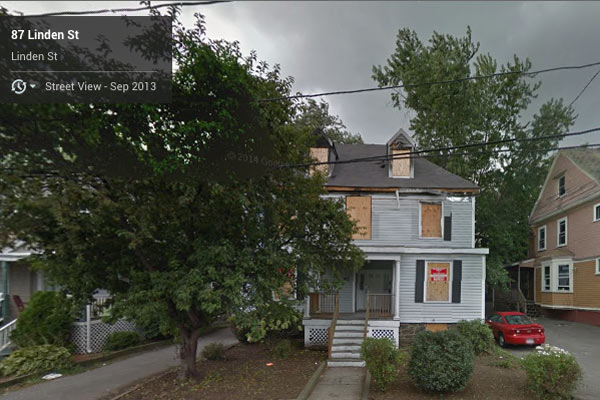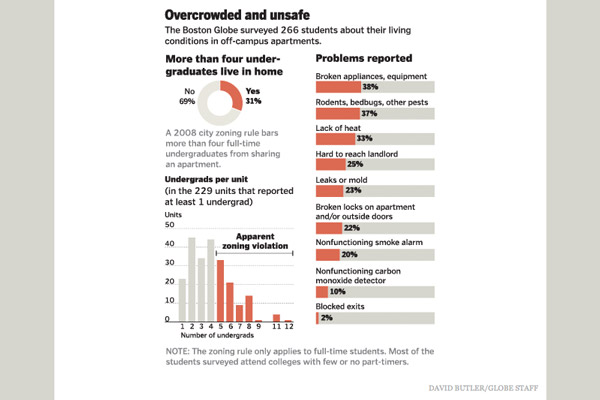
The Roles Landlords, Inspectors, Universities and Students and Families Play
There are one hundred and fourteen colleges and universities in the Commonwealth of Massachusetts(1). Each year on September 1, students across the State move into off campus apartments. Those landlords, who rent apartments to students, have legal responsibilities to provide safe and habitable housing. Unfortunately, landlords do not always live up to their responsibilities.
Yesterday, Boston City officials found 120 housing violations and issued 21 tickets of $300 each for unsafe or unsanitary units and 1,100 tickets for code violations.(2)
The City’s increased vigilance follows the tragic death of a Boston University senior, Binland Lee, who died in her illegal attic bedroom during an April 2013 fire.
Two (2) Years ago Lee moved into her overcrowded apartment in Allston, Mass. She died 8 months later on April 8, 2013 in a tragic fire at 87 Linden St. As reported by The Boston Globe, she convinced her mother to let her move off campus so she could save money for her masters program.
Nine (9) residents and four (4) guests escaped the fire. Five (5) jumped out of windows, seven (7) fled the building. Lee, however, was found dead by a dormer window in her bedroom. She died from smoke inhalation.
Aug. 20, 2014 her father, Wah Lee, representing her estate, filed a lawsuit against the landlord and brokers for renting Lee an illegal apartment with insufficient exits and a faulty fire-alarm system.
Anna Belokurova, the landlord bought the property in 2002. Prior owners were cited for basement bedrooms without permits. It was Belokurova’s responsibility as the landlord to follow the Mass. Regulations regarding Landlords and Tenants. When landlords choose to ignore safety regulations intended to protect their tenants, those landlords may be responsible for any foreseeable consequences.
In 2008, the Boston Zoning Board unanimously approved a measure that limits undergraduate students in the city to no more than four roommates per apartment. The new limits, effective March 13, 2008, apply only to “full-time undergraduate students at a post-secondary educational institution” and do not apply to graduate students or to other unrelated groups of people.
Research by the Boston Globe’s Spotlight Team on “Shadow Campus”, indicates the problem with student housing is exacerbated by the Universities promising student housing to thousands of new students and then are not able to provide it. Even those who do get student housing can cost over $16 thousand dollars for two semesters room and board. Students see off-campus housing that costs $700 to $1000 a month as a way to save money.
There are many sides to this story. All parties must be informed and understand the issues and risks involved in overcrowding and disregarding the regulations. Massachusetts requires that the Minimum Standards Of Fitness For Human Habitation (State Sanitary Code, Chapter II) be met.
Massachusetts Regulation 105 CMR 410.400, provides detailed requirements for space per person:
410.400: Minimum Square Footage
(A) Every dwelling unit shall contain at least 150 square feet of floor space for its first occupant, and at least 100 square feet of floor space for each additional occupant, the floor space to be calculated on the basis of total habitable room area.
(B) In a dwelling unit, every room occupied for sleeping purposes by one occupant shall contain at least 70 square feet of floor space; every room occupied for sleeping purposes by more than one occupant shall contain at least 50 square feet of floor space for each occupant.
(C) In a rooming unit, every room occupied for sleeping purposes by one occupant shall contain at least 80 square feet of floor space; every room occupied for sleeping purposes by more than one occupant shall contain at least 60 square feet for each occupant.
Yet, students surveyed the last week of Aug. 2014 say they will live with five or more roommates.
What is Being Done to Manage The Student Housing Problem?
Based on the success of the Leading the Way housing strategy, Mayor Menino convened the Housing Boston 2020 Advisory Panel to develop a new strategy for Boston’s changing demographics.
Housing Boston 2020
Executive Summary – College & University Housing (pg. 10)
House 10,000 more full time students and further reduce the number of students
living in off-campus housing, which will require about $1.5 billion in new
investment by Boston’s colleges and universities. There are no specific actions
recommended for implementation in 2013, but for a new administration starting
in 2014, the following actions are recommended:• Institutional Housing Plans. Require all colleges to create a plan showing how
each college will, over time, reduce its reliance on the private rental housing
stock to house its students and their families, especially underserved
populations such as graduate students and students from moderate-income
families that cannot afford high dorm fees.• Co-Development. Support, but properly regulate, new forms of student
housing production, including co-development models where private
developers create housing that is leased back to the college.• Linkage. Modify the Linkage program to reflect the much greater impact on
the housing market that college expansion has compared to all other forms of
commercial development.
The City Vows Vigilance on Safety
William Christopher Jr. was named by Mayor Martin J. Walsh as the new commissioner of inspectional services in May, days after the Spotlight series by The Boston Globe.
The City Council amended the city’s University Accountability Ordinance on Aug. 20 so that it not only requires colleges to provide a breakdown of the number of students living in each ZIP code, but now must also include the address and unit number for student apartments by Nov. 15 each fall, and within 45 days of the beginning of each semester or quarter. This anonymous report with no student names included will also list whether the individual is an undergraduate or graduate student, and will help inspectors identify potential trouble spots.
Learn more about Premises Liability
Photo Sources:
Google Map 87 Linden Street, Allston, Mass.
Graphic – Globe survey of 266 students living off-campus in Boston – David Butler/Globe Staff
Article Sources:
(1)Wikipedia List of colleges and universities in Massachusetts
(2)The Boston Globe As students return, Boston on alert for rental violations
The Boston Globe Shadow Campus Part 1
Boston.com Wrongful Death Suit Expected After Fatal Fire in Overcrowded Allston Apartment
The Boston Globe Shadow Campus Part 2 – OVERCROWDED AND AT RISK: A WAY OF LIFE AND, SOMETIMES, DEATH FOR STUDENT TENANTS
Massachusetts Law Updates Measure approved allows no more than four roommates per apartment
The Commonwealth of Massachusetts, City of Boston, In Zoning Commission: TEXT AMENDMENT NO. 345 [PDF]
Massachusetts Law About Landlord and Tenant
105 CMR 410.000 – Mass.Gov [PDF]
The Boston Globe “Shadow Campus” A Globe documentary – Special Reports
Housing Boston 2020 [PDF]
The Boston Globe As students move in, city vows vigilance on safety

